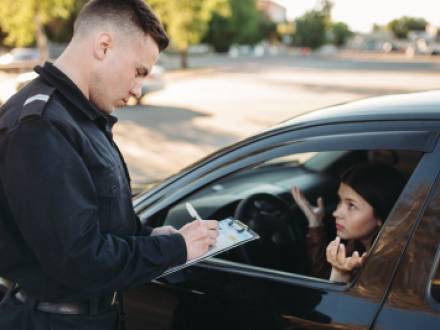Recent Blog Posts
What Counts as Harassment in Tennessee?
 Harassment can take various forms, and if you are accused of this offense, you could face jail time and a criminal record. When facing harassment charges, a Knox County, TN criminal defense attorney can protect your rights in a court of law.
Harassment can take various forms, and if you are accused of this offense, you could face jail time and a criminal record. When facing harassment charges, a Knox County, TN criminal defense attorney can protect your rights in a court of law.
A criminal record is something to avoid at all costs. At Jeffrey Coller, Knoxville Criminal Defense Attorney, we understand the gravity of a harassment accusation, and we can review your case to determine your best defense strategy. Oftentimes, digging deep into the legal definition of harassment can help your case.
Can Verbal or Written Threats Result in Criminal Charges?
Putting another person in fear for his or her physical safety can be charged as harassment. Under Tennessee law, the definition of harassment includes "communicating a threat to another person" in any context. To qualify as harassment, this communication must be intended as a threat of harm. Moreover, the law states that a "reasonable person" would understand the communication to be a threat of harm.
Is Underage DWI a Serious Offense in Tennessee?
 For many people under 21, an underage drinking charge may be their first encounter with law enforcement. In Tennessee, drunk driving while under 21 is known as driving while impaired, or DWI. If you have been accused of DWI, you may be anxious about how the charge will affect your future. A Tennessee DWI defense lawyer can provide you with counsel and representation to help protect your best interests.
For many people under 21, an underage drinking charge may be their first encounter with law enforcement. In Tennessee, drunk driving while under 21 is known as driving while impaired, or DWI. If you have been accused of DWI, you may be anxious about how the charge will affect your future. A Tennessee DWI defense lawyer can provide you with counsel and representation to help protect your best interests.
A conviction of DWI in Tennessee can come with serious consequences. At Jeffrey Coller, Knoxville Criminal Defense Attorney, we know what is at stake in cases like these. When you work with our firm, we will provide you with strong advocacy to work toward the best possible outcome.
What Is the Zero Tolerance Law?
Tennessee has a "zero tolerance" law against underage drinking. Essentially, this means that drivers under 21 are held to much stricter standards when it comes to alcohol consumption. For most drivers, the legal limit for alcohol in the bloodstream is a blood alcohol concentration of .08 percent. However, if you are under 21, the limit is .02 percent.
Three Critical Elements of an Identity Theft Charge
 White collar crimes are not as sensationalized as violent offenses, but make no mistake – you can still face serious penalties if you are convicted of one. Identity theft is a felony offense punishable by years in prison, so it is important that you seek out a Tennessee criminal defense lawyer who can represent you in court and protect your rights.
White collar crimes are not as sensationalized as violent offenses, but make no mistake – you can still face serious penalties if you are convicted of one. Identity theft is a felony offense punishable by years in prison, so it is important that you seek out a Tennessee criminal defense lawyer who can represent you in court and protect your rights.
At Jeffrey Coller, Knoxville Criminal Defense Attorney, we understand what is at risk for you in an identity theft charge. If you have been arrested on suspicion of stealing somebody else’s personal information, we will work to build a case in your defense. Remember that the prosecution must prove your guilt beyond a reasonable doubt for a conviction. We will question the prosecution’s argument and hone in on any weaknesses.
Securing Somebody Else’s Identifying Information
In order to secure a conviction for an identity theft charge, the prosecutor must prove that you "knowingly obtained, possessed, bought, or used" somebody else’s personal identifying information. The most important word here is "knowingly." You may have been found with somebody else’s identifying information, but that does not necessarily mean that you knew you had it.
What Alternatives Are There to Jail Time in Tennessee?
 Getting charged with a crime does not necessarily mean you will end up in jail. Depending on the violation and the court’s decision, other sentencing options could be imposed instead of confinement. A Tennessee criminal defense lawyer can go over your case with you and discuss your options in private.
Getting charged with a crime does not necessarily mean you will end up in jail. Depending on the violation and the court’s decision, other sentencing options could be imposed instead of confinement. A Tennessee criminal defense lawyer can go over your case with you and discuss your options in private.
Note that while other sentencing options exist, there is no guarantee that you can avoid jail time in any situation. With over a decade of legal experience, Attorney Jeffrey Coller has the legal knowledge and skills to effectively advocate for your rights in court.
Can I Avoid Jail Time Through Probation?
Probation can be a highly preferable outcome to a criminal case. Of course, probation is only a possibility under specific circumstances and with certain charges; not all convictions have the option of probation.
Probation allows you to enjoy life outside of bars, which can be critical for holding down your current job or staying housed. That being said, probation always comes with conditions that, if not closely followed, could result in your incarceration.
Why Should I Fight a Traffic Violation?
 After being served with a ticket for a traffic violation, you may be tempted to simply pay the fine and move on. However, taking the path of least resistance may not be in your best interests. Paying a traffic ticket is equivalent to pleading guilty, so you will face all the consequences of a conviction. A Tennessee traffic defense attorney can represent you in court and work toward an ideal outcome on your behalf.
After being served with a ticket for a traffic violation, you may be tempted to simply pay the fine and move on. However, taking the path of least resistance may not be in your best interests. Paying a traffic ticket is equivalent to pleading guilty, so you will face all the consequences of a conviction. A Tennessee traffic defense attorney can represent you in court and work toward an ideal outcome on your behalf.
Fighting a traffic violation requires a comprehensive knowledge of the law. At Jeffrey Coller, Knoxville Criminal Defense Attorney, we can defend you against charges of reckless driving, speeding, and similar offenses.
Criminal Penalties for Traffic Offenses
Convictions of certain traffic violations can leave you with a criminal record. This information will show up on background checks run by your present and future employers, and it can stand in the way of your housing opportunities in the future. On top of that, a criminal conviction can also incur heavy fines or jail time.
When Are Juvenile Cases Heard in Adult Court?
 Juvenile court allows for lenient, rehabilitative sentencing for minors who are accused of crimes. However, sometimes, a minor’s right to juvenile court can be waived. When a juvenile is transferred to adult court, the consequences can become much more permanent and severe. If your child has been accused of a serious offense, a Tennessee criminal defense lawyer can provide your family with representation and counsel.
Juvenile court allows for lenient, rehabilitative sentencing for minors who are accused of crimes. However, sometimes, a minor’s right to juvenile court can be waived. When a juvenile is transferred to adult court, the consequences can become much more permanent and severe. If your child has been accused of a serious offense, a Tennessee criminal defense lawyer can provide your family with representation and counsel.
At Jeffrey Coller, Knoxville Criminal Defense Attorney, we have years of experience in criminal law, and we know how to defend against serious allegations. When you work with our firm, we will explore all possible strategies to minimize the charges against your child.
Age Cutoff
As a child grows older and more mature, the courts may factor that into whether to handle a case in juvenile court or adult court. For defendants aged 16 and older, it is at the court’s discretion to decide whether the charge should be handled in juvenile or adult court. Additionally, a law introduced in July 2024 allows for minors as young as 15 to be tried as adults for organized retail crime or theft of a firearm.
Do I Have to Unlock My Phone or Computer for Police?
 If law enforcement believes you have committed a crime, they may have seized your cell phone and/or computer. In today’s world, these devices are much more than communication or work devices. Our phones and computers are full of personal, sensitive information – which is why they have become a cornerstone of many federal investigations.
If law enforcement believes you have committed a crime, they may have seized your cell phone and/or computer. In today’s world, these devices are much more than communication or work devices. Our phones and computers are full of personal, sensitive information – which is why they have become a cornerstone of many federal investigations.
Warrants for cell phone and computer evidence are most often sought in child pornography cases, as well as for many white-collar crimes, including embezzlement, money laundering, and health, insurance, and mortgage fraud. If you are facing federal charges and your cell phone or computer has been seized, it is important that you speak to an experienced Anderson County, TN federal crimes attorney as quickly as possible.
When Can a Personal Phone or Computer Be Searched?
If you are arrested on suspicion of a federal crime, the police cannot search the data on your phone or computer without a warrant unless you consent to the search. Your phone and computer can also be lawfully searched without a warrant if you happen to be on probation or parole.
New Bill Would Require DNA Collection for All Felony Arrests
 A recent bill introduced by a state representative (HB 473) would require law enforcement officers to collect DNA samples from anyone in the state arrested for a felony criminal offense. The new bill details procedures for collecting DNA samples and the management of those samples by law enforcement.
A recent bill introduced by a state representative (HB 473) would require law enforcement officers to collect DNA samples from anyone in the state arrested for a felony criminal offense. The new bill details procedures for collecting DNA samples and the management of those samples by law enforcement.
If the bill passes, anyone arrested for a felony offense in the state would be required to submit a DNA sample before being released. The DNA samples would be sent to the Tennessee Bureau of Investigation for analysis, where they would be "safely stored" and could potentially be used in future criminal investigations.
The idea behind the bill is that DNA samples could help solve cold cases as well as prevent individuals from committing additional crimes. The representative who introduced the bill specifically mentioned a sexual assault and murder from 1997 of a mother and her son. While DNA was collected at the crime scene, the technology for analysis was not readily available.
MaKayla’s Law Introduced to Amend Reckless Endangerment
 HB 0167 and SB 033 have been introduced to enact "MaKayla’s Law." This bill amends the offense of reckless endangerment to specifically include the reckless failure to secure or lock a firearm when it results in a child under the age of 13 gaining possession of the firearm and injuring or killing the child or another person.
HB 0167 and SB 033 have been introduced to enact "MaKayla’s Law." This bill amends the offense of reckless endangerment to specifically include the reckless failure to secure or lock a firearm when it results in a child under the age of 13 gaining possession of the firearm and injuring or killing the child or another person.
Unfortunately, far too many tragedies occur from unsecured firearms, and now parents or other adults who failed to secure the firearm could find themselves charged with reckless endangerment. If you are facing charges of reckless endangerment, speaking to an experienced Anderson County, TN criminal defense lawyer can be beneficial.
Why Is MaKayla’s Law Necessary?
Between 2015 and 2023, the state of Tennessee had 158 unintentional shootings by children – the third-highest rate of any state during that time period (following Louisiana and Mississippi). Overall, Tennessee has the 12th highest rate of gun deaths in the U.S., with no laws requiring gun owners to securely store their firearms. Following the Covenant School shooting in Nashville in 2023, lawmakers strengthened protections for the gun industry rather than passing gun safety legislation.
How a Hate Crime Conviction Could Affect Gun Rights
 According to the Tennessee government’s 2021 report on hate crimes in the state, almost 58 percent of these hate crimes were based on race, ethnicity, or ancestry bias. Of the 77 hate crimes in this category, 49 were committed against Black individuals. About 10 percent of the hate crimes were based on religious bias, and 23 percent were based on sexual orientation bias.
According to the Tennessee government’s 2021 report on hate crimes in the state, almost 58 percent of these hate crimes were based on race, ethnicity, or ancestry bias. Of the 77 hate crimes in this category, 49 were committed against Black individuals. About 10 percent of the hate crimes were based on religious bias, and 23 percent were based on sexual orientation bias.
The remaining 9 percent of the hate crimes during that year were committed against those with physical and mental disabilities. The state of Tennessee’s current gun laws and hate crimes have some fairly significant gaps. The hate crime law in Tennessee is narrow, making it a felony known as "civil rights intimidation" to injure or threaten to injure another person with the intent to intimidate them in an unlawful manner from exercising their legal, constitutionally protected rights.



 Map & Directions
Map & Directions


